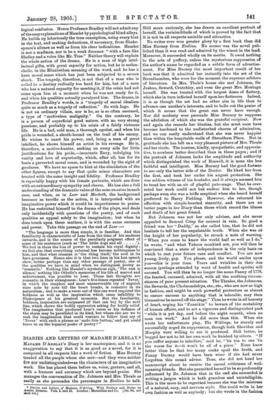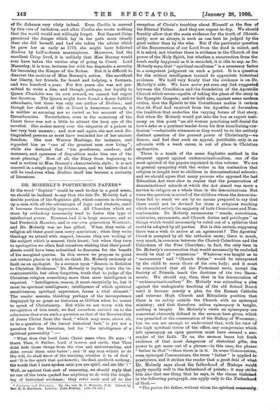MADAME D'ARBLAY'S Diary is her masterpiece, and it is no
exaggeration to say that it is as good as a novel, for it is composed in all respects like a work of fiction. Miss Burney treated all the people whom she met—and they were neither few nor undistinguished—as the characters of an imaginative work. She has placed them before us, voice, gesture, and all, with a humour and accuracy which are beyond praise. She manages the conversation of Dr. Johnson and Mrs. Thrale as easily as she persuades the personages in Evelina to talk.
• Diaries and Letters of Madame D'Arblay. With Preface and Notes by Austin Dobson. 'Vols. L and IL London ; Macmillan and Co. [10s. 6d. net each vol.]
Still more curiously, she has drawn an excellent portrait of herself, the verisimilitude of which is proved by the fact that it is not in all respects amiable and attractive.
No writer ever won greater glory by a first book than did Miss Burney from Evelina. No sooner was the novel pub- lished than it was read and admired by the wisest in the land. Moreover, it succeeded wholly on its merits. It owed nothing to the arts of puffery, unless the mysterious suppression of the author's name be regarded as a subtle form of advertise- ment. For Miss Burney the most important result of her book was that it admitted her instantly into the set of the Streathamites, who were for the moment the supreme arbiters of literature. In Mrs. Thale's house she met Johnson, Sir Joshua, Seward, Crutchley, and even the great Mrs. Montagu herself. She was treated with the largest doses of flattery, which she in turn inflicted herself upon her flatterers. Indeed, it is as though the set had no other aim in life than to advance one another's interests, and to ladle out the praise of which it seems that the great can never have enough. Nor did modesty ever persuade Miss Burney to suppress the adulation of which she was the grateful recipient. Now and again she records her blushes, but she must soon have become hardened to the undisturbed chorus of admiration, and we can easily understand that she was never happier than within the hospitable walls of Streatham Place. But in gratitude she has left us a very pleasant picture of Mrs. Thrale and her circle. The hostess, kindly, sympathetic, and apprecia- tive, is nowhere better described than in these pages ; and if the portrait of Johnson lacks the amplitude and authority which distinguished the work of Boswell, it is none the less faithful and intelligent. Miss Burney had the good fortane to see only the better side of the Doctor. He liked her from the first, and took her under his august protection. She was seldom witness of his boutades, and it always amused him to treat her with an air of playful patronage. That he over- rated her work could not but endear him to her, though perhaps even she was a trifle sceptical when she beard herself preferred to Harry Fielding. However, she returned his affection with simple-hearted sincerity, and there are no better pages in her Diary than those which record the illness and death of her great friend.
But Johnson was not her only adviser, and she never appealed to Samuel Crisp for counsel in vain. So good a. friend was her " Daddy," as she called him, that he did not hesitate to tell her the unpalatable truth. When she was at the height of her popularity, he struck a note of warning. " When you come to know the world half so well as I do," he wrote, " and what Yahoos mankind are, you will then be convinced that a state of independence is the only basis on which to rest your future ease and comfort. You are now young, lively, gay. You please, and the world smiles upon you—this is your time. Years and wrinkles in their due season (perhaps attended by want of health and spirits) will succeed. You will then be no longer the same Fanny of 1778, the feasted, caressed, admired, with all the soothing circum- stances of your present situation. The Thrales, the Jobnsons, the Sewards, the Cholmondeleys, etc., etc., who are now so high in fashion, and might be such powerful protectors as almost to ensure success to anything that is tolerable, may then themselves be moved off the stage." Thus he wrote in all honesty of heart, urging his "Fannikin" to beware of the mutability of human affairs, and to act a vigorous and distinguished part " while it is yet day, and before the night cometh, when no man can work." And he did more than this. When she wrote her unfortunate play, The Witlings, he sternly and successfully urged its suppression, though both Sheridan and Murphy were willing to see it produced. Still better, he begged her not to let her own work be finished by others. " If you suffer anyone to interfere," said be, " 'tis ten to one 'tis the worse for it—it won't be all of a piece." None knew better than he that too many cooks spoil the broth, and Fanny Burney would have been wiser if she had never forgotten this sound advice. True, she did not hand her manuscript about to receive the casual criticisms of well- meaning friends. But she permitted herself to be so profoundly influenced by Dr. Johnson that in the end sbe succeeded in writing a jargon which is both graceless and unintelligible. This is the more to be regretted because she was the mistress of a natural, easy, and nervous style. She could write in her own fashion as well as anybody ; but she wrote in the fashion
of Dr. Johnson very vilely indeed. Even Cecilia is marred by this vice of imitation, and after Cecilia she wrote nothing that the world would not willingly forget. But Samuel Crisp perceived the danger which lay in her path more clearly than she did herself, and had she taken the advice which he gave her as early as 1778, she might have followed Evelina by half-a-dozen masterpieces. Moreover, had the excellent Crisp lived, it is unlikely that Miss Burney would ever have taken the unwise step of going to Court. Lord Macaulay, it is true, lectures her with too dogmatic a severity for becoming the Keeper of the Robes. But it is difficult to discover the motives of Miss Burney's action. She sacrificed her liberty, her friends, for board and lodging, a footman, and two hundred a year. For five years she was not per- mitted to write a line, and though, perhaps, her loyalty to Queen Charlotte was its own reward, we cannot but regret her devotion. The Queen might have found a dozen faithful attendants, but there was only one author of Evelina; and though her sketch of life at Court is humorous enough, it is neither so amusing nor so varied as her account of the Streathamites. Nevertheless, even in the monotony of the Court there was not a little to attract the keen eye of the novelist. She makes merry over the etiquette of a palace in her very best manner ; and now and again she saw such dis- tinguished persons as must have reminded her of her ancient freedom. She met Warren Hastings, for instance, and regarded him as " one of the greatest men now living " ; while she declared that " his gentleness, candour, soft manners, and openness of disposition make him one of the most pleasing." Best of all, the Diary from beginning to end is written in Miss Burney's characteristic style ; it is not marred in a single page by Johnsonese, and we believe that it will be read even when Evelina itself has become a. curiosity of literature.
DR. MOBERLY'S POSTHUMOUS PAPERS.*























































 Previous page
Previous page